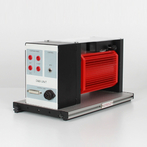
Electrical machines and drives are present everywhere in daily life – whether in
vacuum cleaners, drills, as the drive for conveyor belts or in cars. In fact, the
fundamental principals of electrical machines have been known for more than 150
years and in recent years there has been technological progress in this field
through further developments, such as Industry 4.0. The knowledge
required by
specialists in this field is becoming ever broader.
Discover more:
with its advantages, the equipment "Synchronous machine with permanent excitation IPM and frequency converter 0,3" and high-efficiency machines
from the machine bank to additional equipotential bonding and didactic preparation
The innovative pendulum machine for force measurement
Develop relationships between force - torque - power independently and on the basis of your own experience
The industrial frequency converter
with the Danfoss inverter at the latest technical level
The innovative measurement technology
with the Power Analyser measuring system
Ready for the future of Electrical Drive Technology
With our machine system 4.0 we have developed a new, safe and highly efficient teaching system for electrical drives. This means your trainees and students are prepared for the latest developments and requirements in practice:
- High efficiency machines as standard for better energy efficiency
- Higher dynamics at high torque
- Less workspace needed
- Modular set-up for all types of drive systems from fundamentals to advanced automation
- Safeguarding of the energy supply
- New industrial sectors, e.g. electric and hybrid cars, wind turbines
The trainees get to know not only the design but also the behaviour and mode of operation of various machine types - from well-established to the most modern and highly efficient machines. They are also in the position to analyse the behaviour under various load conditions, calculate the characteristic values and record machine-typical characteristic curves. The effects in electrical networks and the most modern switching devices are also acquired.
Overview of the subject areas
- Construction and operation of machines
- Beahivour of machines as motors
- Behaviour of machines as generators
- Speed setting options
- Efficiency
- Load simulation
- Load setting options
- Characteristics of the modes as motor as well as generator
- Activation and braking
- No-load operations and short circuit tests

